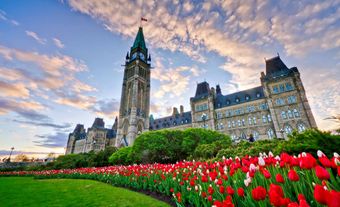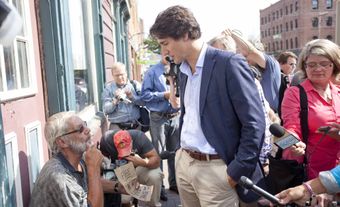What Is Political Patronage?
Political patronage is the dispensation of favours or rewards such as public office, jobs, contracts, subsidies, prestige or other valued benefits by a patron (who controls their dispensation) to a client. The patron is usually an elected official or is otherwise empowered to make such grants. In return, the client supplies the patron with some valued service, such as voting for the patron’s party or providing money or labour for electoral campaigning (see Political Party Financing). The relationship between patron and client is typically unequal, selective and discretionary; the patron does not generally grant favours to all potential clients but picks and chooses among them.
Federal Governor in Council appointments are often referred to as patronage appointments. (The Governor in Council is the Governor General of Canada, who makes the appointments on the advice of cabinet.) Since it would be impossible for elected officials to manage everything in the federal government’s jurisdiction, the executive branch appoints people to run crown corporations and other federal organizations. For example, the respective presidents, chairpersons and boards of directors of crown corporations such as the Canadian Broadcasting Corporation (CBC) and Canada Post and federal organizations such as Atomic Energy of Canada and the Copyright Board are appointed through the Governor in Council process. There are more than 200 federal agencies with executive leadership roles that are filled through Governor in Council appointments.
In addition to Governor in Council appointments, political patronage frequently involves appointing political campaign staff to an elected official’s office staff and may also involve appointing party loyalists to the Senate or the judiciary.
Patronage is not restricted to the federal government; any political apparatus with the ability to make appointments, including provincial and municipal governments, can engage in patronage.
Patronage, Corruption and Conflict of Interest
The relationship between patron and client is often murky and may involve go-betweens, or brokers, in cases of corruption and conflict of interest. In addition, many potential clients are rewarded not for specific quid pro quo exchanges but for party loyalty. For example, a long-time political donor might not explicitly purchase or bribe their way into an appointment, but they may be rewarded for their long-time support. This type of patronage is not necessarily illegal, but it may rise to the level of corruption if it gives an individual or group some private advantage that is contrary to the public interest. For example, if it is legally required that government contracts go to the lowest bidder, rewarding a contract to a client even though their bid was not the lowest would amount to corruption.
Controversial examples of corrupt patronage include the Pacific Scandal of 1873, the Beauharnois Scandal of 1930–32 and the Sponsorship Scandal of the 1990s and 2000s. In the first two cases, individuals linked with political parties privately benefited from major public works projects in a manner generally considered contrary to the public interest. In the Sponsorship Scandal, federal funds earmarked for advertising in Québec went to Liberal-friendly ad agencies and loyalists for little or no work and in some cases were funnelled back into the Liberal Party (see also Conflict of Interest).
Combatting Corruption and Political Patronage
Canadian parties have traditionally used patronage to build political machines to maintain their advantage over rivals. Elaborate machines were created by the Conservative and Liberal parties in the 19th and 20th centuries respectively, and by many provincial parties. Since passing the 1974 Election Expenses Act, Parliament and several provincial legislatures have attempted to control political donations and election spending and have tightened laws governing election practices and party financing, notably in 2004. In 1918, the government passed the Civil Service Act, which imported the “merit principle” into public servicestaffing decisions. The public service has also become less vulnerable to patronage and corruption because the merit principle generally governs recruitment and promotion. Where civil servants are unionized, resistance to such practices is even greater.
The optics of patronage appointments, regardless of whether or not an ethical breach exists, make the system ripe for public outrage. Nepotism, corruption and cronyism in government are politically unpopular, and the system is often exploited for political gain. In 1984, outgoing prime minister Pierre Trudeau appointed more than 70 Liberals to Governor in Council positions. The appointments raised a public outcry, but when John Turner took over as prime minister, he did not revoke them. In the ensuing election campaign, Brian Mulroney famously scolded Turner during a televised debate for claiming he had no option but to allow the appointments. The exchange is widely cited as the turning point in the election.
After winning the election, Mulroney established the Special Committee on the Reform of the House of Commons (known as the McGrath Committee) to investigate, among other things, the Governor in Council appointment process. The committee recommended using the merit principle and introduced a limited, advisory role for standing committees of Parliament to review appointments. The McGrath Committee also allowed that some appointments should be entirely free from scrutiny.
In his 2006 report on the Sponsorship Scandal, Justice John Gomery recommended that high-level appointments to crown corporations be based on the merit principle. As part of its Federal Accountability Act (2006), the government of Prime Minister Stephen Harper established the Public Appointments Commission to oversee the fairness of public appointments. When Harper appointed his friend and long-time Conservative supporter Gwyn Morgan as commissioner, opposition parties blocked the nomination as the type of patronage the commission was meant to combat. In response, Harper scrapped the commission.
In early 2016, the government of Prime Minister Justin Trudeau, in response to 33 patronage appointments made by the outgoing Conservative government, established a new system for Governor in Council appointments. The system does not create an oversight committee and does not prevent the Governor in Council from appointing party loyalists. Instead, the system attempts to make the selection process open and transparent by posting open positions and qualifications online and soliciting applications. Ministers are instructed to make appointments based on qualifications, as well as gender parity and diversity guidelines.
The Future of Patronage in Canada
Since the practice of patronage ranges from relatively harmless staffing decisions, to suspect appointments of political loyalists, to outright criminal corruption, bribery and kickbacks, eliminating patronage from government is difficult. Despite attempts at reform, it remains an important aspect of Canadian politics; prime ministers Pierre Trudeau, Brian Mulroney, Jean Chrétien, Paul Martin and Stephen Harper all made high-profile patronage appointments.
Provincial governments make appointments similar to the Governor in Council system, and the type of potential benefits extends well beyond these appointments. Thousands of government contracts are vulnerable to improper lobbying, and high-profile appointments like ambassadorships and Senate positions can still be given to party loyalists.
Concerned citizens can use Elections Canada’s online database to cross-reference any appointee against their political donation history.

 Share on Facebook
Share on Facebook Share on X
Share on X Share by Email
Share by Email Share on Google Classroom
Share on Google Classroom


